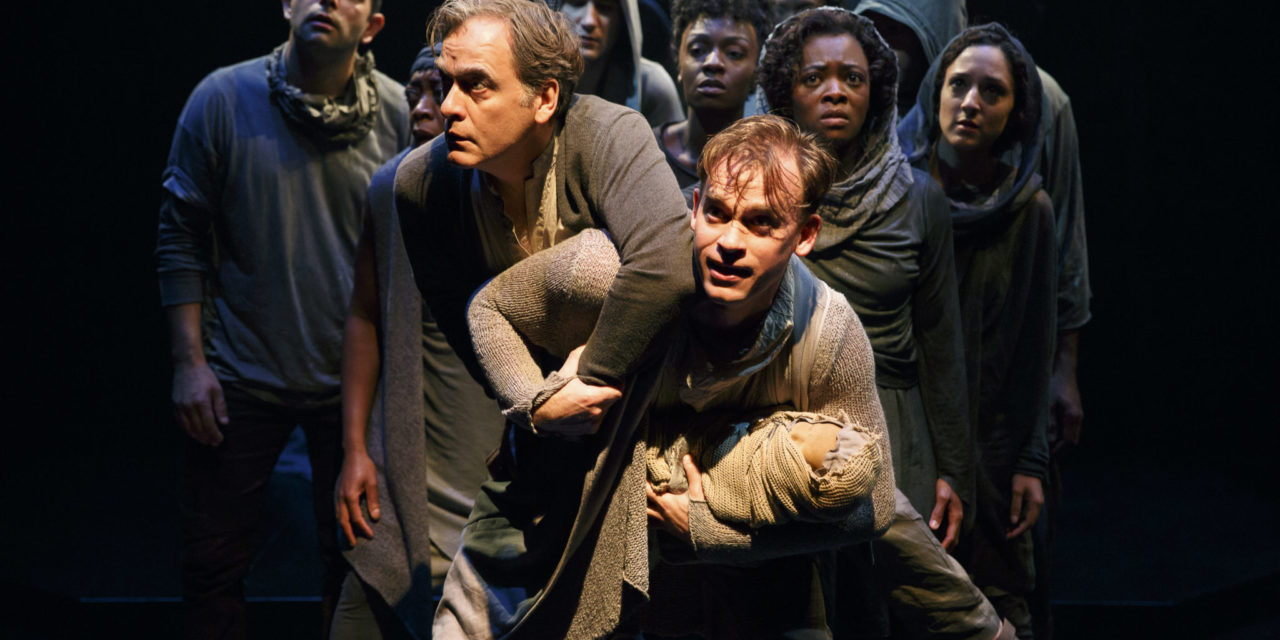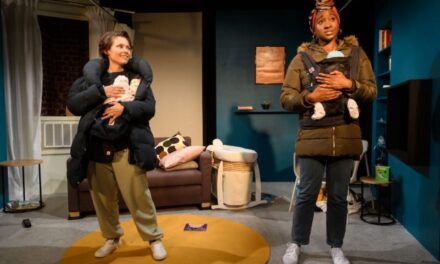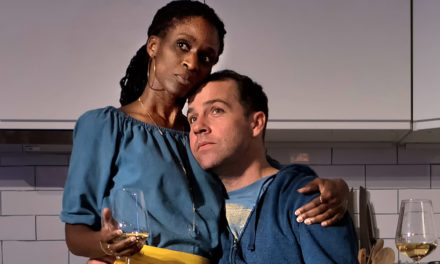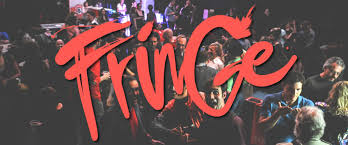In today’s political, economic and social climate, with mass migration turning into a new norm, it is impossible not to think of Olivier Kemeid’s dramaturgy as farsighted and foretelling. The Quebecois playwright published L’Eneide, his dramatic adaptation of Virgil’s poem, in 2008 before the current migration crisis. Yet with its tenacious questioning of the potential impact of the presence of new immigrants on the rapidly changing western world, Kemeid’s adaption of Virgil’s The Aeneid becomes tremendously urgent. Through its poetic language, stylized movement and surrealist imagery, both Kemeid’s text and director Keira Loughran’s production speak of migration in historical and philosophical terms, aiming for a deeper understanding of the encounter between ordinary people (migrants) and nation-states.
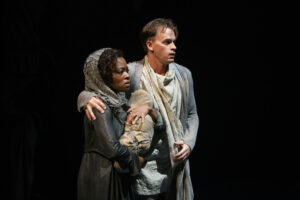
Monice Peter as Creusa and Gareth Potter as Aeneas in The Aeneid. Photography by David Hou.
Loughran casts Gareth Potter in the role of Aeneas, the contemplative and reluctant leader of the migrants’ flock. As imagined by bothVirgil and Kemeid, he is an instrument of fate: an ordinary man confronted with the extraordinary circumstances of war and exile. Potter brings to his Aeneas the youthful bravery he also gives to his role as King Peter in The Lion, the Witch, and the Wardrobe, yet this particular casting choice troubled some critics, including Karen Fricker, who saw it as a dangerous reinforcement of the “existing power structures dominated by white male heterosexual authority” in the Aeneid. It is indeed a remarkable choice, one I believe was meant to make it easier for the Stratford Festival’s mostly heterogeneous and well-off audience to better connect and sympathize with the suffering of migration. It also struck me as daring in its suggestive power to romanticize the fate of migration and to implicate the festival’s audiences into today’s social battles, if not directly then emotionally.
Written under the influence of Homer’s original, in which Aeneas is forced to flee his native city Troy, Virgil’s poem was often seen as a propaganda piece. The text became the defining narrative of the Roman Empire in which the vision of a prosperous economic, cultural, political and military regime was put forward. Virgil also broke with the Homeric tradition of charismatic character—warriors and his Aeneas only reluctantly follows his heroic fate. While fulfilling the noble mission the Gods prepared for him, he remains highly disengaged.
Kemeid’s adaptation is driven by similar goals. The play is not simply a transposition of Virgil’s tale into a new historical context; it is a contemporary take on the story of migration as seen by the writer, a third-generation exile himself. Ultimately the play acts as a cautionary tale: the Ghost of Aeneas’ wife, Creusa, does not accept his state of inaction. Self-pity, she explains, is something no exile or migrant can afford. The hope, the help, and the future depend on the migrant’s own free will. No state-authorities, social organizations, or even fellow citizens will be eager to help. Between the horrors of the past and the barbed-wire fences of present-day refugee camps and detention centres there is only a no-man’s land, a utopia of future empire of the humiliated and insulted, those who Aeneas meets on his journey to the underworld. The picture drawn by Kemeid is unmistakably modern: they are the “Russian Jews looking for a new Odessa,” “peoples from Mozambique,” “Liberians in Sierra Leone,” “mixed blood Tutsis and Hutus Tajkis,” “Palestinians from Gaza,” and “Chinese Indonesians.” Aenaes’ own people complete this long list of the displaced, and he must “carry the seeds of [his] civilization” and “found nations or destroy them.”
In order to bring this mission to life, Aeneas must leave his “hate at the foot of a barbed-wire fence” and “make rules for peace;” the future depends on him marrying someone connected to the land in order to “mix [his] blood with hers” so that “a New World will be born.” This idealistic picture, however, is never brought to life. On the route to the utopian New World, Aeneas loses friends, loved ones, and political supporters. He does cross the barbed-wire fence, but when he does so it is with blood on his hands. The ending is open; it implies that a New Rome, based on the principles of cosmopolitanism and tolerance, with a heterogeneous family unit in its centre, is yet to be built. The conclusion also questions whether it is actually possible for such conditions as mass migration and exile to become the basis of new democratic states and whether the new ruling established by migrants and outcasts has a dangerous potential to turn into the mechanism of new dictatorships, the familiar trope of the 20th century.
Loughran’s production ends reassuringly, with Aeneas standing atop the vertical structure that serves as the production’s set. The structure transforms throughout the play into the migrants’ ship, the detention centre, and the underworld of the dead. In this closing image, Aeneas surveys a no-man’s land with his son and his people; his body turns to the audience and his arm points above our heads towards a time when the new empire ruled by exiles and migrants will be created. Loughran thus neatly, and perhaps dangerously, resolves the dramatic ambiguity, but our own reality, like Kemeid’s text, remains ambiguous and undecided.
The Aeneid, written by Olivier Kemeid, translated by Maureen Labonté, directed by Keira Loughran. Playing until October 4 at the Studio Theatre, 99 Downie Street, Stratford. Stratfordfestival.ca and 1-800-567-1600.
This article was originally published on alttheatre.ca. Reposted with permission. Read the original article.
This post was written by the author in their personal capacity.The opinions expressed in this article are the author’s own and do not reflect the view of The Theatre Times, their staff or collaborators.
This post was written by Yana Meerzon.
The views expressed here belong to the author and do not necessarily reflect our views and opinions.

